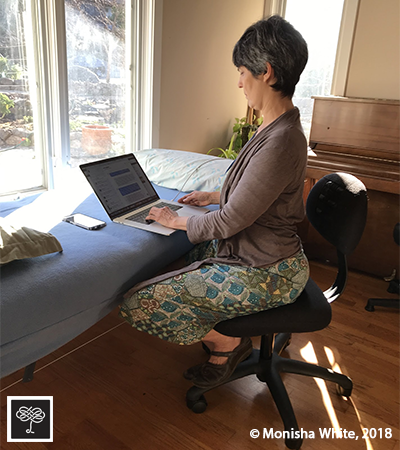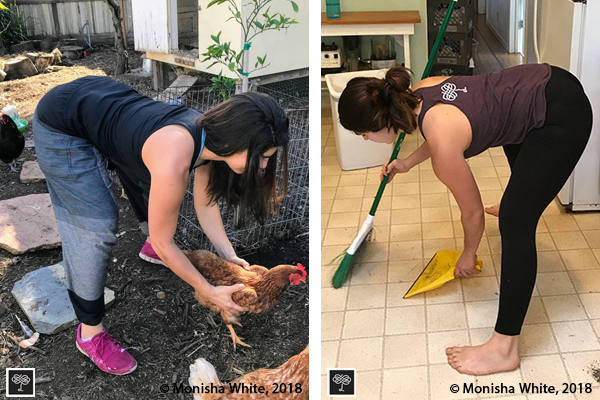What's the Best Way to Stretch Your Hamstrings?
I get this question quite often. The answer is two-fold:
Maintain a healthy baseline length in your hamstrings/glutes by learning to tip your pelvis forward in stacksitting, tallstanding, and glidewalking. When you tuck your pelvis, you bring your ischial tuberosities (sitz bones) in closer to where these muscles attach on the leg. This allows the hamstrings/glutes to adapt to a short resting length. Short hamstrings make you more vulnerable to hamstring injuries when you perform motions that require normal or elongated hamstrings. Tears can happen within the muscle, or, more commonly, where the hamstrings attach to the ischial tuberosities.

Keeping your pelvis tipped forward while sitting helps maintain a healthy glute baseline length. A tipped pelvis while standing maintains a healthy hamstring length.
Hip-hinge to bend, whether you are loading the dishwasher, feeding your pets, or setting the table. In this way, you give your hamstrings a big stretch on and off throughout the day. This is a much more effective way of restoring hamstring flexibility than is compartmentalizing your stretches to an exercise period.

When you use hip-hinging for everyday activities like picking things up and cleaning, you’re turning these activities into a hamstring stretch.
Hamstring injuries heal slowly. Nature was not expecting that we would strain our hamstrings frequently. Hip-hinging would have been a routine activity for our hunter-gatherer ancestors, so hamstrings would have been well-stretched and not prone to tearing. So Nature did not provision the area with a rich blood supply. If a hamstring tears, the lack of circulation in the area makes healing a long process.
By hip-hinging to stretch the hamstrings periodically throughout the day and anteverting (tipping) the pelvis to maintain a healthy hamstring baseline length, you are joining the ranks of your ancestors. You will be able to work, play, and live without being strung up from unnecessary and painful injuries that are a pain in the butt.
If you'd like to learn hip-hinging in our Foundations Course, reach out to a teacher near you. Once you’ve begun anteverting your pelvis and hip-hinging, we’d love to hear: have you noticed any differences in your hamstring flexibility?

Comments
Presuming the lower leg bend
Presuming the lower leg bend is the same whether the pelvis was retroverted (tucked) or anteverted (forward-tilted), then the hamstrings would indeed be more lengthened in the anteverted position. They are drawn further away from their insertion behind the knee as the sitz bones, where they originate, travel in the opposite direction.
My wife once described my hip
My wife once described my hip hinging as "bending over while sticking your butt out." When I hip hinge, I do tend to stick my butt out as I attempt to maintain my weight toward my heels and feel a stretch in my hamstrings. Is that appropriate? Thanks.
It's normal for your behind
It's normal for your behind to be behind you and rise up as you bend. If you're not used to this position, it might feel like "sticking the butt out." To someone who is not used to seeing you do this, it could look like "sticking the butt out." you and your wife just need to get used to this new (old!) way of using your body.
What you want to be sure you are not doing is tightening your back muscles to arch the butt backwards. This kind of "sticking the butt out" would cause unhealthy compression in the low back.
Small additional note: Don't try to maintain your weight over the heels; it's normal for the weight to shift forward when you bend.
When you tuck your pelvis,
When you tuck your pelvis, you bring your ischial tuberosities, also known as sitz bones, closer to where the hamstrings and glutes attach on the leg. This position allows these muscles to adapt to a shorter resting length. The developers of Tomb of the Mask regularly release updates that include new levels, challenges, and features. Keep an eye out for these updates to keep the adventure going!
Add New Comment
Login to add commment
Login